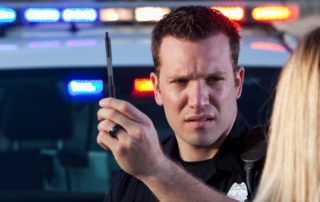You’ve Been Charged with DWI. Now What?
Even if you know you’re guilty of driving while impaired, you do have DWI defense options to reduce or minimize a conviction. Often, especially on a first offense, it makes sense to go to trial. There’s a saying in legal circles: if you don’t try the case, lightning can’t strike. This means you never know when a losing case will turn into a winner. The lightning could be that one piece of key evidence getting misplaced, or the officer inexplicably mixing up his facts.
There are many strategies for defending against a DWI charge; many more than the average criminal defense lawyer knows about. Each of those strategies is worthy of exploring. That’s why you need an experienced DWI Defense Attorney, like those at Dummit Fradin, on your side.
Six Common North Carolina DWI Defense Options
1- The absence of reasonable articulable suspicion.
If the arresting officer pulled you over without reasonable articulable suspicion, you could have a valid defense against your DWI charge.
Before a police officer can pull you over, or stop you, they must have a reasonable articulable suspicion that a crime has been committed. This means the officer simply can’t stop you based on a “hunch” or “gut feeling.” The officer must have a reasonable belief based on facts or circumstances that a crime has been, is being, or will be committed.
2- Inaccurate field sobriety tests.
There are currently three field sobriety tests that are scientifically approved by the National Highway Travel and Safety Administration (NHTSA) and are often used by law enforcement to develop probable cause to arrest. These tests are the Horizontal Gaze Nystagmus (HGN), the walk and turn test, and the one-leg stand. Of course, there are other optional tests that an officer can use to establish probable cause. However, according to NHTSA, these other tests are not supported as scientifically valid.
In addition, police officers must undergo official NHTSA training to perform these field sobriety tests correctly. If the test is not conducted according to standard procedure, its scientific validity may be questioned. Our DWI defense attorneys have also taken the NHTSA training for these field sobriety tests, so they have first-hand knowledge about how these tests work.
3- Inaccurate breath test.
One of the ways an officer can measure the amount of alcohol in your system is by administering a breath test, or breathalyzer test. A breath test measures the number of ketones that your body gives off as it processes alcohol. It does not, however, measure the alcohol in your blood as a blood test would. Unfortunately, breath tests are sometimes subject to machine error. Several outside factors may affect your breath test results.
4- Improper administration or tampering of a blood test.
Blood tests generally follow a structured process, which means there should be less room for error. The arresting officer will take you to the hospital or EMS station where a nurse or EMT will draw your blood. They’ll usually draw two vials of blood, which allows for retesting if necessary. But, there are still ways in which blood test results can become invalid.
The most common issue with blood testing is errors in the chain of custody. After your blood is drawn, it needs to be handled and stored properly. Otherwise, the blood quality could deteriorate and even ferment. In addition, proper paperwork and documentation could fall through.
5- You were not actually driving the vehicle.
You may be surprised to find that the arresting officer needs to also prove you were driving the vehicle. For instance, let’s say you were sitting in the car with the key in the ignition but the car wasn’t turned on. This case would be handled differently than if you were pulled over while you were driving.
6- The officer violated your civil rights.
In some cases, the police officer may have not followed proper protocol when arresting you. This is potential grounds to argue for a case dismissal.

I cannot say enough good things about my attorney. His knowledge of DWI case law is vast and his professionalism in court was unmatched. He was able to get my entire case dismissed before trial by showing that the officer who charged me did not follow proper arrest procedure. The judge called his motion to dismiss “brilliant”. I highly recommend him for any DWI-related matter.
Mike represented me on two DWI charges both were dismissed. DWI charges are hard to overcome if convicted you will lose your license, pay high fees, do community service, and your insurance will really be high. If you want to have a fighting chance call Mike he is very knowledgeable and helpful.
Mr. Dummit was a great help to me in an interlock case. He was very honest about the process and what to expect in different cases. He was very re-assuring when all the facts about my case were gathered and consulted with me numerous times before the actual case. He was always very prepared, was available at times that many attorneys would not be, and treated me with the utmost respect in all situations. His staff was very friendly and professional in all their dealings with me and I would recommend his law firm overwhelmingly to anyone that is in need. I can not express my appreciation enough to Mr. Dummit, Mr. Fradin and their whole firm.
Read More
from our DWI Attorneys
from our DWI Attorneys
A Plea Bargain May Be One of Your Best DWI Defense Options
Sometimes, The State has a solid case against you. Your DWI Defense Attorney should have enough experience to know if a plea bargain will be in your best interest. Every case is different, with differing circumstances, testimony, testing, prosecutors, witnesses, etc. Your attorney will need to review all the evidence before they can give you solid legal advice. However, sometimes one of the best DWI defense options is to take a plea. This will mean a conviction on your record, but generally, a plea deal will lessen the consequences considerably, including saving you the time and expense of a lengthy trial. Before you decide which of the DWI defense options is right for your case, speak to a professional experienced DWI Defense Attorney, like those here, at Dummit Fradin. For your convenience, we have offices in Winston-Salem and Greensboro, North Carolina.
Consult with a Dummit Fradin DWI Lawyer
When you face a North Carolina DWI charge, we strongly suggest you consult a proven and experienced DWI attorney about your case as soon as possible. At Dummit Fradin, we are prepared to offer you the tailored defense options you deserve. So, contact us to schedule your free consultation.



